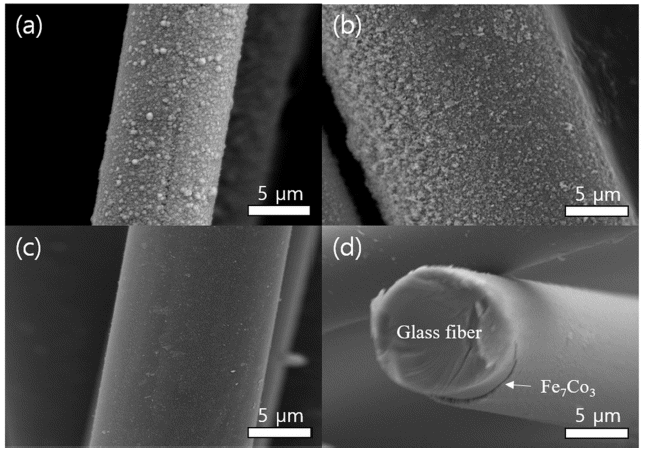Search
- Page Path
- HOME > Search
- [Korean]
- A Study on Rinsing Effects of Sn Sensitization and Pd Activation Processes for Uniform Electroless Plating
- Seong-Jae Jeong, Mi-Se Chang, Jae-Won Jeong, Sang-Sun Yang, Young-Tae Kwon
- J Powder Mater. 2022;29(6):511-516. Published online December 1, 2022
- DOI: https://doi.org/10.4150/KPMI.2022.29.6.511

- 1,750 View
- 14 Download
-
 Abstract
Abstract
 PDF
PDF Electroless plating is widely utilized in engineering for the metallization of insulator substrates, including polymers, glass, and ceramics, without the need for the application of external potential. Homogeneous nucleation of metals requires the presence of Sn-Pd catalysts, which significantly reduce the activation energy of deposition. Therefore, rinsing conducted during Sn sensitization and Pd activation is a key variable for the formation of a uniform seed layer without the lack or excess of catalysts. Herein, we report the optimized rinsing process for the functionalization of Sn-Pd catalysts, which enables the uniform FeCo metallization of the glass fibers. Rinsing enables good deposition of the FeCo alloy because of the removal of excess catalysts from the glass fiber. Concurrently, excessive rinsing results in a complete removal of the Sn–Pd nucleus. Collectively, the comprehensive study of the proposed nanomaterial preparation and surface science show that the metallization of insulators is a promising technology for electronics, solar cells, catalysts, and mechanical parts.
- [Korean]
- Fabrication of Fecralloy Foil Coated by Fecralloy Nanoparticles Using Electrospray Processing
- Jung-Yeul Yun, Sang-Sun Yang, Hye-Young Koo, Hye-Moon Lee
- J Korean Powder Metall Inst. 2011;18(6):526-531.
- DOI: https://doi.org/10.4150/KPMI.2011.18.6.526
- 772 View
- 0 Download
- 5 Citations
-
 Abstract
Abstract
 PDF
PDF - Fecralloy is the promising materials for high temperature exhaust filtering system due to the excellent its oxidation resistance property. In this research, Fecralloy nanoparticles coated Fecralloy thin foil was prepared by a single nozzle electrospray system in order to increase surface area of Fecralloy foil. Fecralloy nanoparticles were fabricated by electrical wire explosion method in ethanol using Fecralloy wires as a source material. Electrospray modes with applied D.C voltages to Fecralloy colloidal solution were investigated to make a stable cone-jet mode. Coated layers with and without additional heat treatment were observed by FE-SEM (field emission-scanning electron microscope) and tape test for evaluating their adhesion to substrate were performed as well.
-
Citations
Citations to this article as recorded by- Performance and techno-economic evaluation of a high-efficiency electrospray cyclone
Jun Su Park, Dae-Gyun Lee, Kang-San Lee, Jin-Han Kim, Jung Hoon Yoo, Hang Joo Shin, Young-Chan Choi, Young-joo Lee, YoungMin Woo, Meehye Lee, Jong Won Choi
Journal of Environmental Chemical Engineering.2024; 12(3): 112908. CrossRef - Electrospray and Thermal Treatment Process for Enhancing Surface Roughness of Fecralloy Coating Layer on a Large Sized Substrate
Hye Moon Lee, Hye Young Koo, Sangsun Yang, Dahee Park, Sooho Jung, Jung-Yeul Yun
Journal of Korean Powder Metallurgy Institute.2017; 24(1): 46. CrossRef - Alloyability of warm formed FeCrAl powder compacts
M.M. Rahman, A.A.A. Talib
Materials Today Communications.2015; 4: 42. CrossRef - Effect of Cell Size on the High Temperature Oxidation Properties of Fe-Cr-Al Powder Porous Metal Manufactured by Electro-spray Process
Jae-Sung Oh, Young-Min Kong, Byoung-Kee Kim, Kee-Ahn Lee
Journal of Korean Powder Metallurgy Institute.2014; 21(1): 55. CrossRef - Effect of Sintering Temperature on the High Temperature Oxidation of Fe-Cr-Al Powder Porous Metal Manufactured by Electrospray Process
Jae-Sung Oh, Young-Min Kong, Byoung-Kee Kim, Kee-Ahn Lee
Journal of Korean Powder Metallurgy Institute.2012; 19(6): 435. CrossRef
- Performance and techno-economic evaluation of a high-efficiency electrospray cyclone
- [Korean]
- Effects of Sintering Temperature and Atmosphere on Densification of Hypereutectic Al-Si Alloy Powders
- Jae-Wook Lee, Sang-Bin Park, Sang-Sun Yang, Yong-Jin Kim
- J Korean Powder Metall Inst. 2008;15(3):196-203.
- DOI: https://doi.org/10.4150/KPMI.2008.15.3.196
- 813 View
- 0 Download
- 1 Citations
-
 Abstract
Abstract
 PDF
PDF - The densification behavior of Al-20Si-5.5Fe-1.2Mg-0.5Mn powders was investigated through micro-structure analysis of sintered specimens. The specimens sintered in vacuum or in high purity (99.999%) nitrogen showed porous near-surface microstructures. The densification of near-surface part was enhanced by means of ultra-high purity (99.9999%) nitrogen atmosphere. The relationship between slow densification and oxide surfaces of Al alloy powders was discussed. And the effects of Mg addition, nitrogen gas, and humidity on densification were discussed. In addition, the rapid growth of primary Si crystals above the critical temperature was reported.
-
Citations
Citations to this article as recorded by- Effect Of Different Mechanical Milling Processes On Morphology And Microstructural Changes Of Nano And Micron Al-Powders
H.-S. Kim, B. Madavali, T.-J. Eom, C.-M. Kim, J.-M. Koo, T.-H. Lee, S.-J. Hong
Archives of Metallurgy and Materials.2015; 60(2): 1235. CrossRef
- Effect Of Different Mechanical Milling Processes On Morphology And Microstructural Changes Of Nano And Micron Al-Powders
- [Korean]
- Technology Trend of Powder-Metallurgical Aluminum Parts
- Jae-Wook Lee, Sang-Sun Yang, Yong-Jin Kim
- J Korean Powder Metall Inst. 2007;14(6):339-347.
- DOI: https://doi.org/10.4150/KPMI.2007.14.6.339
- 382 View
- 0 Download
TOP
 KPMI
KPMI


 First
First Prev
Prev


